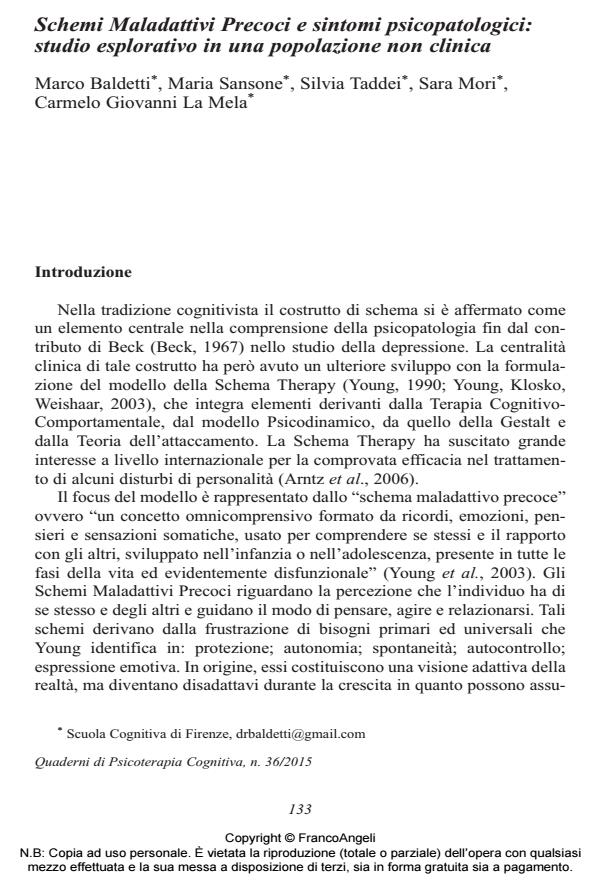Early maladaptive schemas and psychopathological symptoms: an exploratory study in a non-clinical population
Journal title QUADERNI DI PSICOTERAPIA COGNITIVA
Author/s Marco Baldetti, Maria Sansone, Sara Mori, Carmelo Giovanni La Mela
Publishing Year 2015 Issue 2015/36 Language Italian
Pages 11 P. 133-143 File size 109 KB
DOI 10.3280/QPC2015-036010
DOI is like a bar code for intellectual property: to have more infomation
click here
Below, you can see the article first page
If you want to buy this article in PDF format, you can do it, following the instructions to buy download credits

FrancoAngeli is member of Publishers International Linking Association, Inc (PILA), a not-for-profit association which run the CrossRef service enabling links to and from online scholarly content.
The interest in the Schema Therapy (ST) has grown in recent years in relation to the results of proven effectiveness shown by this kind of treatment on borderline personality disorder. These results have directed the attention of researchers on one of the central constructs of schema therapy, the early maladaptive schemas (EMS) and the possible relationship of EMS with psychopathological symptoms. Schema therapy, suggests a relationship between rigidity and pervasiveness of schemas and the risk of developing a psychopathological suffering (Young, 1990; Young et al., 2003). The present work investigates the relationship between Early Maladaptive Schemas and psychopathological symptoms in a sample consisting of 394 subjects from a non-clinical population. The results, in line with the reference literature, confirm a relationship between Early Maladaptive Schemas, investigated with the Young Schema Questionnaire-Short form 3 (YSQ-S3), and the variables measured by the Symptom Check List (SCL-90) in the expected direction, confirming a correlation between early maladaptive schemas and psychopathological symptoms.
Keywords: Early maladaptive schema, Young Schema Questionnaire, Schema Therapy.
- Alvani A., Khosravani V., Khademi E., Seidisarouei M. (2015). Prediction of interpersonal sensitivity, psychoticism, paranoia, hostility based on the early maladaptive schemas in the murders. International Journal of Technical Research and Application, 3: 166-169. Arnz A. (2006). Outpatient psychotherapy for borderline personality disorder: randomized trial of schema-focused therapy vs transference-focused psychotherapy. Archives of General Psychiatry, 63(6): 649-658. DOI: 10.1001/archpsyc.63.6.64
- Beck A.T. (1967). Depression: Clinical, Experimental and Theoretical Aspects. New York: Hoeber Medical Division, Harper & Row.
- Chuah S.C., Drasgow F., Roberts B.W. (2006). Personality assessment: Does the medium matter? Journal of Research in Personality, 40: 359-376. DOI: 10.1016/j.jrp.2005.01.00
- Cui L., Lin W., Oei, T.P.S. Factor structure and psychometric properties of the Young Schema Questionnaire (Short Form) in Chinese undergraduate students. International Journal of Mental Health and Addiction (in press).
- Derogatis L.R. (1992). The SCL-90-R, administration, scoring and procedures manual (2nd ed.). Towson , MD: Clinical Psychometric Research.
- Hawke L.D., Provencher M.D. (2012b). The Canadian French young schema questionnaire: confirmatory factor analysis and validation in clinical and nonclinical samples. Canadian Journal of Behavioural Science, 44(1): 40-49. DOI: 10.1037/a002619
- Herrero J., Meneses J. (2006). Short web-based versions of the Perceived Stress (PSS) and Center for Epidemiological Studies-Depression (CESD) Scales: A comparison to penciland-paper responses among Internet users. Computers in Human Behavior, 22 : 830-846. DOI: 10.1016/j.chb.2004.03.00
- Klaghofer R., Brahler E. (2001). Konstruktion und teststatistiche Prufung einer Kurzform der SCL-90-R(Construction and psychometric evaluation of a short-form of the SCL-90-R).
- Zeitschrift für Klinische Psychologie, Psychiatrie und Psychotherapie, 49: 115-124. DOI: 10.1027/1015-5759/a00014
- Kriston L., Schafer J., Jacob G.A., Lars M.H., Holzel L.P. (2013). Reliability and Validity of the German Version of the Young Schema Questionnaire – Short Form 3 (YSQ-S3). European Journal of Psychological Assessment, 29: 205-212. DOI: 10.1027/1015-5759/a00014
- Lee C.W., Taylor G., Dunn J. (1999). Factor structure of the Schema Questionnaire in a large clinical sample. Cognitive Therapy and Research, 23: 441-451. DOI: 10.1023/A:101871220293
- Sansone M., Baldetti M., Caini S., Mori S., Taddei S., La Mela C. (2014). Adattamento italiano dello young schema questionnaire short form 3 (ysq-s3), XVII Congresso Nazionale SITCC, Genova 25-28 settembre 2014.
- Sar¤tasC-Atalar D., Gencoz., T. (2015). The mediating role of early maladaptive schemas in the relationship between maternal rejection and psychological problems. Turk Psikiyatri Derg, 26: 40-7. DOI: 10.1007/s10862-011-9261-6
- Schmidt N.B., Joiner T.E., Young J.E., Telch M.J. (1995).The Schema Questionnaire: Investigation of psychometric Properties and the hierarchical structure of maladaptive schemas. Cognitive Therapy and Research, 19 : 295-321. DOI: 10.1007/BF0223040
- Soygut G., Karaosmano˚glu A., Cak¤r Z. (2009). Assessment of early maladaptive schemas: a psychometric study of the Turkish young schema questionnaire-short form-3. Turkish Journal of Psychiatry, 20: 75-84. DOI: 10.1016/0959-4388(94)90083-
- Stopa L., Thorne P., Waters A., Preston J. (2001). Are the short and long forms of the young schema questionnaire comparable and how well does each version predict psychopathology scores? Journal of Cognitive Psychotherapy: An International Quarterly, 15: 253-272.
- Young J.E. (1990). Cognitive Therapy for Personality Disorder: A Schema-Focused Approach. Sarasota, FL: Professional Resource Exchange, Inc Young J.E. (1998). The Young Schema Questionnaire: Short Form.
- Young J.E. (2003). Young Schema Questionnaire –Long Form 3(YSQ-L3). New York: Schema Therapy Institute.
- Young J.E., Brown G. (2003). YSQ-S2.
- Young J.E., Klosko J.S., Weishaar M.E. (2003). Schema Therapy. A Practitioner's Guide. New York: The Guilford Press.
- Young J.E. (2005). Young schema questionnaire – short version (YSQ-S3). New York: Cognitive Therapy Center of New York.
- Adverse Childhood Experiences and Early Maladaptive Schemas as Predictors of Cyber Dating Abuse: An Actor-Partner Interdependence Mediation Model Approach Laura Celsi, F. Giorgia Paleari, Frank D. Fincham, in Frontiers in Psychology 623646/2021
DOI: 10.3389/fpsyg.2021.623646
Marco Baldetti, Maria Sansone, Sara Mori, Carmelo Giovanni La Mela, Schemi Maladattivi Precoci e sintomi psicopatologici: studio esplorativo in una popolazione non clinica in "QUADERNI DI PSICOTERAPIA COGNITIVA" 36/2015, pp 133-143, DOI: 10.3280/QPC2015-036010